
Russian Neo-Nazi Movement Facing State Crackdown
Russian Neo-Nazi Movement Facing State Crackdown
The Russian authorities have long been dismissive of the growing neo-nazi movement within the country. However, on March 11 the National Anti-Terrorist Committee (NAK, the high-level inter-departmental agency that coordinates the anti-terrorist activities of the security services) named neo-nazi youth groups as "one of the major terrorist threats" to Russia. The NAC report cited the interior ministry’s data (the MVD, is a member of the NAK), which asserts that right-wing extremist movements have now reached 200,000 members -around four times more than human rights groups have claimed- with approximately 10,000 people facing charges for extremist related crimes (www.ntvru.com, March 11).
Russian neo-nazis have felt protected by the state. Their organizational structures simply kept changing from one shape to another, covered and protected by the security services to such an extent that in July 2004 a St. Petersburg-based Neo-Nazi party leader Yuri Belyaev, as well as rank-and file members of the Shultz-88 neo-nazi group (the "8" stands for "H" -the eighth letter in the latin alphabet. Hence, 88 spells out HH or Hail Hitler) went on record boasting about the murders they had committed (www.time.com, August 1, 2004).
The watershed for open neo-nazi violence was the murder of Nikolai Girenko on June 19, 2004. A 64-year-old ethnographer and anthropologist, he was also the leading expert on the growth of the Russian neo-nazis. The founder of the Group for the Rights of Ethnic Minorities (GPEM), Girenko had been a key adviser in 15 Russian ethnic hate-crime trials, including the prosecution of six members of Schultz-88 for violent assault. Now, the state prosecution has charged the notorious "Mad Crowd" neo-nazi group with his murder, currently standing trial in St. Petersburg (www.rian.ru, February 27).
The Russian neo-nazis have committed too many crimes to remain stubbornly ignored or openly endorsed by the authorities. On April 6, 2003, the Mad Crowd group attacked the MacDonald’s restaurant in downtown St. Petersburg (www.vsesmi.ru, April 6, 2003). On February 18, 2007, the same group returned to bomb the restaurant.
On June 12, 2005, two members of the neo-nazi RNE movement blew up the Grozny-Moscow train. Though the original jury sympathized with the defendants and acquitted them, both were subsequently found guilty and sentenced on April 10, 2007 (www.gazeta.ru, April 10, 2007). The Nevski Express train was blown up en route from Moscow to St. Petersburg in August 2007 using a bomb which was identical to the one used on the Grozny-Moscow train in 2005. One year earlier, students from a prestigious Moscow school and members of neo-nazi groups, bombed the Cherkizov market in Moscow to oppose the growing number of migrants, killing 10 and injuring 49 (Kommersant-Vlast, August 28, 2006). In a separate incident in August 2007, a three-minute video clip of the cold blooded execution of two young men from the North Caucuses remained on the Internet for 18 hours. The masked murderers identified themselves only by a large banner displaying a swastika (www.kriminalist.ru, August 22, 2007). On October 13, 2007, a member of the Shultz-88 neo-nazi group tried to bomb the Rock Club in St. Petersburg during a concert.
More recently, on January 19, four neo-nazi groups, suspected of committing serial murders, were detained in Moscow (www.news.ru, January 19). The following day, the Federal Security Service (FSB) confirmed the detention of youths suspected of bombing two railways and a church in Moscow as well as committing serial race-hate murders (www.news.ru, January 20).
This list is far from exhaustive, but its implications are serious. In 2004, a member of Shultz-88 told Time magazine that neo-nazis modeled their cells on al-Qaeda – they come together for an attack and then disperse. He said members of neo-nazi groups kept in touch through the internet and by other means, both domestically and abroad (www.time.com, August 1, 2004).
However, a recent crackdown on neo-nazis appears to have replaced the former pattern of lenience, which might reflect the deepening concern of the authorities with this neo-nazi movement. The Russian state does not tolerate competition. Yuliya Latynina told the Moscow-based Novaya Gazeta bi-weekly: "Fascism is an ideology which asserts the exceptional quality of a particular people and explains that all around it are its enemies….Try to find ten differences between that and what [the pro-Kremlin youth group] "Nashi" professes" (www.novayagazeta.ru, April 29).
Indeed, with the incumbent regime growing more dictatorial in its efforts to manage the worsening economic crisis, neo-nazi groups will either lower their profile -or face a state-led crackdown. Many both inside and outside Russia cannot accept the reality of Neo-Nazism raising its head "in the country that fought a war of survival to crush it." But the Russians "did not really fight fascism," points out Pavel Bardin, who filmed "Russia-88," the first ever movie on Russian neo-nazis. "They fought for their land, children, family and for the Motherland…" (www.ferghana.ru, April 28).
Bardin’s words also evokes the tragic memory of the Russians that lived for decades under Stalin’s communism. Those who accepted social racism might as easily embrace a biological equivalent, since the roots of both ideologies are the same. "Until we sort out Stalin," Bardin says, "The fertile breeding ground for fascism will remain. As long as we justify Stalin, anything else might be justified" (www.ferghana.ru, April 28).


